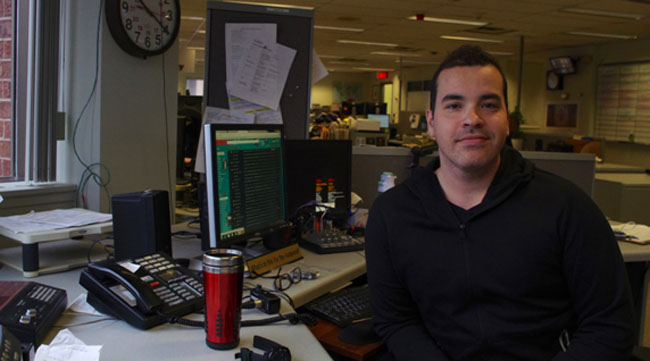CBC journalist back home reporting

By Rick Garrick
Fort William First Nation’s Michael Dick is looking to expand CBC Thunder Bay’s digital content, including web stories and videos, as the radio station’s new executive producer.
“I want to expand our digital content — that’s a priority of CBC and me,” says Dick, who previously worked at NHK World (Nippon Hoso Kyokai) in Japan. “The region we cover is like the size of France, so I think digital is an important way to reach places like Summer Beaver and Webequie and Fort Severn. I’m hoping we can do more digital content and expand our radio show so we can get more diverse voices on it.”
Dick also wants to expand the opportunities for CBC Thunder Bay’s reporters to report from remote communities across northwestern Ontario.
“I want to see our reporters up in places we don’t normally get to go to,” Dick says. “That is important for our audience and for us to see these communities that we report on. You can’t tell the story sometimes unless you’ve walked the mile in the community and understand the places and the people.”
Dick says he will never forget a trip to cover one of former lieutenant governor James Bartlemen’s book drops in Fort Severn about seven or eight years ago.
“People don’t realize how big the north really is and how important reaching people is in those communities,” Dick says. “Fort Severn for me was an eye-opener, how different things are even from Thunder Bay. I’ll never forgot what it was like up there.”
Dick has received a “really positive” response from the Fort William and Thunder Bay communities about his management role.
“Not many people who are Aboriginal maybe get to be fortunate enough to be in a position where you run something and are in charge,” Dick says. “I’m very proud to tell people that I am from Fort William and that this is my community. If you stick with things, it can pay off.”
Dick credits his father’s advice for following his journalism career. His father, Moccasin Joe, is his biggest cheerleader.
“My father is a big reason why I am here,” Dick says. “He’s always told me to follow my dreams, and my dreams were journalism, so I’m here because of him.”
Dick began his journalism career as an intern at CBC Thunder Bay before moving on to CBC stations in New Brunswick, Toronto, Edmonton and Halifax. He studied at Acadia University and University of King’s College in Nova Scotia, where he earned his journalism degree.
“The CBC is where I’ve gotten all my training,” Dick says. “They’ve been very good since I started here, investing in me and giving me opportunities. I started as a reporter and I worked as a video-journalist, able to shoot my own material and edit my own material.”
After working as a producer at CBC, Dick jumped at the opportunity to work as a correspondent and consultant at NHK World, where he was a consulting producer for Newsline, a 24-hour English news program.
“(Newsline) reaches 160 million homes around the world,” Dick says. “I oversaw content before it went to air. It was not a management role, but it was a senior role in the newsroom. That helped me to make the decision that I wanted to get into the management side.”
When he returned to CBC Thunder Bay, Dick was surprised to see the number of staff who had been cut.
“I was taken back by how many people were left and actually how hard they have to work,” Dick says. “They’re carrying a lot of work every day to get people news and to tell their stories.”


